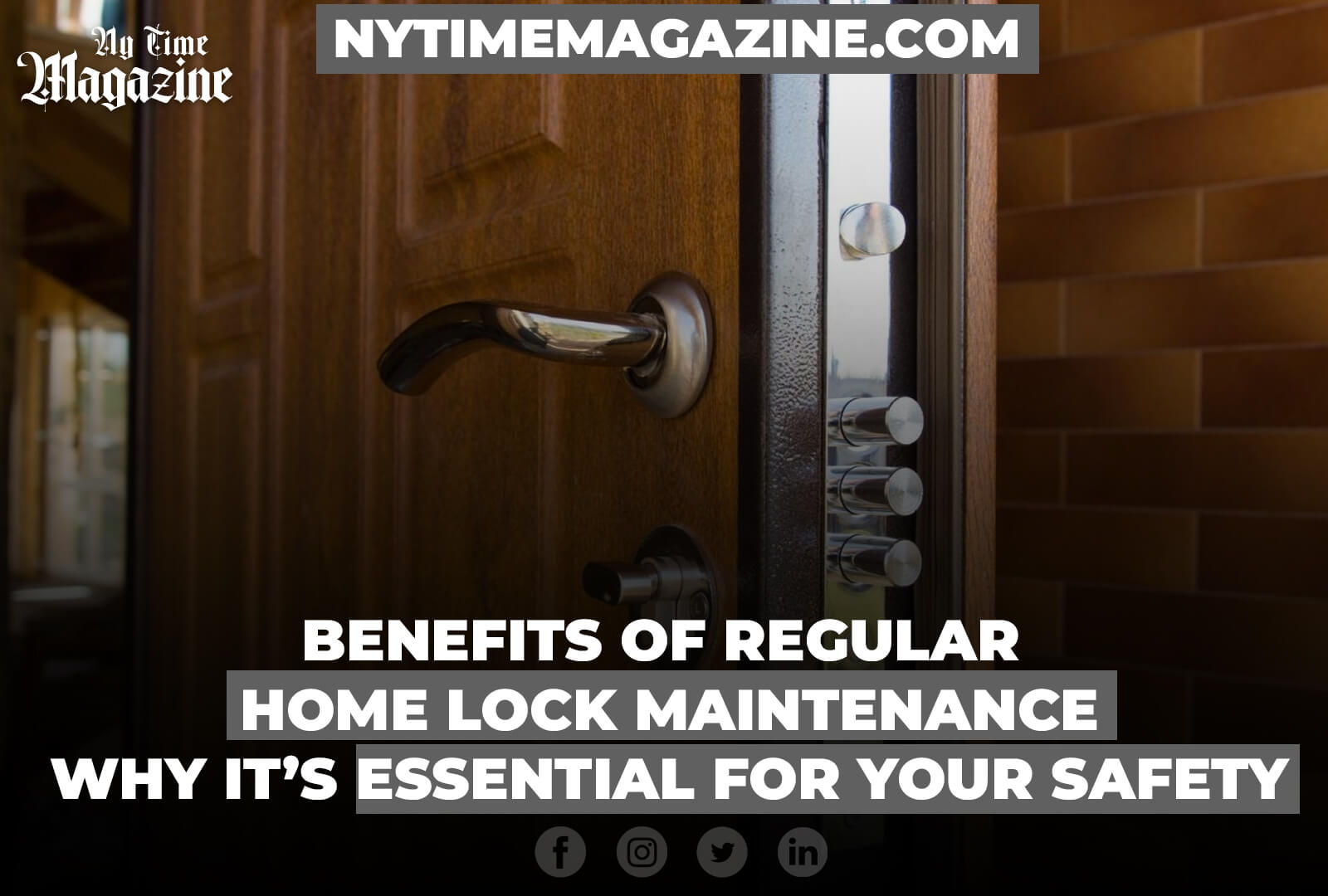In today’s fast-paced world, safeguarding our homes is paramount. One often overlooked aspect of home safety is the upkeep of our locks. Regular home lock maintenance isn’t just a matter of convenience; it’s a matter of security. According to a study conducted by the Bureau of Justice Statistics, 58% of burglaries involved forcible entry, many of which could have been thwarted with stronger, well-maintained locks. Routine lock maintenance ensures not only the durability of your locks but also enhances your home’s security.
In this comprehensive guide, we’ll delve into the numerous advantages of regular home lock maintenance and why it’s crucial for your safety.
Contents
Benefits Of Regular Home Lock Maintenance
Locks serve as the first line of defense against potential intruders. A well-maintained lock can deter burglars, ensuring that your home remains a sanctuary. Here are some of the key benefits of consistent lock maintenance:
Enhanced Security: The foremost benefit of regular home lock maintenance is heightened security. Modern locks are equipped with advanced features designed to bolster security. Regular upkeep guarantees that these features, such as anti-pick and anti-bump mechanisms, function as intended. A well-maintained lock serves as a formidable barrier against unauthorized access.
Cost Savings: Routine maintenance can help you detect minor issues before they escalate into major problems that necessitate costly lock replacements.
Convenience: Well-maintained locks operate smoothly, ensuring you don’t encounter difficulties when locking and unlocking your doors.
Extended Lifespan: Regular maintenance can extend the lifespan of your locks, reducing the need for frequent replacements.
Safety: Incorrectly maintained home locks may fail to lock properly or could even jam, potentially trapping you inside your house. Regular maintenance ensures your locks are safe to use.
Peace Of Mind: Knowing that your home’s locks are in excellent working condition provides peace of mind, especially when you’re away from home.
Value Preservation: Good maintenance helps maintain the value of your home. Potential buyers or renters might be deterred by the sight of rusty or poorly functioning locks.
Avoiding Lockouts: Regular lock maintenance can help prevent lockouts. If a lock isn’t functioning correctly, it may suddenly stop working, resulting in a lockout. Regular maintenance can identify potential issues before they become major problems, ensuring your locks work when you need them most.
Ensuring Proper Functioning: Over time, locks can become less effective due to wear and tear. Regular maintenance ensures they continue to function as they should.
Early Detection Of Problems: Regular maintenance allows for the early detection of problems. For instance, if your key is getting stuck, a locksmith can address the issue before you end up with a broken key or damaged lock.
Maintaining Home Insurance Compliance: Many home insurance policies have requirements related to home security. A faulty or poorly maintained lock can void your insurance coverage in the event of a break-in. Regular lock maintenance ensures you remain compliant with your insurance policy, providing peace of mind.
Professional Maintenance vs. DIY
When it comes to maintaining the locks in your home, you have two primary options: Do-It-Yourself (DIY) or hiring a professional locksmith. Both approaches have their merits, but they also come with distinct differences. Here, we’ll provide a detailed comparison to help you make an informed decision.
DIY Lock Maintenance
Cost-Effective: One of the main advantages of the DIY approach is the potential for cost savings. Without the need to hire a professional, you can often maintain your locks at a fraction of the price.
Flexibility: DIY allows you to work on your locks at your own pace and on your own schedule. There’s no need to coordinate with a locksmith’s availability.
Learning Experience: Taking the DIY route can be a valuable learning experience. You’ll gain a deeper understanding of how your locks work and the satisfaction of handling issues on your own.
Limitations: While there are numerous DIY guides available, they might not cover every unique situation or lock type. This can lead to incomplete or ineffective maintenance.
Risk Of Mistakes: Without professional training, there’s a higher risk of making mistakes, which can lead to further damage or compromised security.
Professional Lock Maintenance
Expertise: Professional locksmiths have undergone extensive training and have years of experience. This expertise allows them to identify and address issues that might be missed in a DIY approach.
Advanced Tools: Professionals come equipped with specialized tools designed specifically for lock maintenance. These tools can make the job more efficient and effective.
Comprehensive Service: A locksmith can provide a thorough assessment of all your locks, ensuring that every potential issue is addressed.
Advice On Upgrades: Professionals stay updated on the latest advancements in lock technology. They can offer advice on upgrading or replacing outdated locks to enhance your home’s security.
Guaranteed Work: Many professional locksmiths offer guarantees on their work, providing peace of mind that the job is done right.
Cost: While hiring a professional might be more expensive upfront than a DIY approach, the long-term benefits and potential savings from avoiding mistakes can offset the initial costs.
Tips For Regular Home Lock Maintenance
Regular Cleaning: Dust and grime can accumulate in and around the lock mechanism. Use a mild detergent and a soft cloth to clean the exterior of the lock. For the interior, a blast of compressed air can dislodge any debris.
Lubrication: At least once a year, lubricate the lock mechanism with a graphite-based lubricant. Avoid using oil-based products as they can attract dirt.
Check For Wear and Tear: Inspect your locks regularly for signs of wear, rust, or damage. If you notice any issues, consider replacing or repairing the lock.
Update Old Locks: If your locks are several years old, consider upgrading to newer, more secure models. Modern locks offer enhanced security features that can better protect your home.
Professional Inspection: Schedule an annual inspection with a professional locksmith. They can identify potential issues and provide recommendations for maintenance or upgrades.
Duplicate Keys: Always use original or high-quality duplicate keys. Poorly made keys can damage the lock or get stuck.
Avoid Forcing The Key: If your key doesn’t turn easily, don’t force it. Forcing can damage both the key and the lock.
Weatherproofing: If your locks are exposed to the elements, consider using weatherproofing products to protect them from rust and corrosion.
Frequently Asked Questions
We have addressed some of the most commonly asked queries to provide you with a better understanding of the benefits of regular home lock maintenance.
Why is regular lock maintenance important?
Regular lock maintenance is crucial for several reasons. It ensures the longevity and optimal functionality of your locks, safeguarding your home from potential security breaches. Over time, locks can wear out or become misaligned, and consistent maintenance helps in early detection and rectification of such issues, ensuring your home remains a secure sanctuary.
Can I handle most lock issues with a DIY approach?
While many basic lock issues can be addressed with a DIY approach, it’s essential to recognize one’s limitations. Some problems, especially those involving advanced lock systems or electronic components, can be intricate and require specialized tools or knowledge. In such cases, a professional touch might be necessary to ensure the lock’s integrity isn’t compromised.
How often should I consider professional lock maintenance?
Ideally, a professional locksmith should inspect and maintain your locks at least once a year. This routine check ensures that any wear and tear or emerging issues are promptly addressed. However, if you encounter any difficulties or suspect something might be amiss with your locks, it’s advisable to seek professional assistance immediately.
Are all professional locksmiths equally qualified?
Not all locksmiths are created equal. It’s vital to select a locksmith with proper credentials, training, and a solid reputation in the industry. Before hiring, it’s a good practice to check for certifications, read customer reviews, and even ask for references to ensure you’re getting top-notch service.
What are the risks of DIY lock maintenance?
While DIY lock maintenance can be cost-effective and satisfying, there are inherent risks. Without the proper tools or knowledge, there’s a chance of damaging the lock mechanism, misaligning components, or even compromising the security of the lock. Such mistakes can lead to more significant issues down the line, potentially resulting in costly repairs or replacements.
Is the cost of hiring a professional locksmith worth it?
While hiring a professional locksmith might have an associated upfront cost, the benefits often outweigh the expense. A locksmith not only brings expertise and specialized tools to the table but also ensures the job is done right the first time. This precision can prevent future issues, saving homeowners potential headaches and costs in the long run.
Ensuring Regular Home Lock Maintenance
Regular home lock maintenance is not just a good practice; it’s essential for the safety and security of your home. It ensures that your locks function optimally, extends their lifespan, and can even save you money in the long run. Whether you choose to do it yourself or hire a professional, regular maintenance is a small investment with significant returns in terms of safety and peace of mind.
Is regular lock maintenance really necessary, or can I wait until a problem arises?
Regular maintenance is essential to prevent lock issues and enhance security. Waiting for problems can lead to costly repairs or replacements.
What are some signs that my home locks need maintenance?
Signs include difficulty turning the key, unusual sounds when locking/unlocking, and visible wear or rust on the lock.
Can I use any lubricant for lock maintenance, or is there a specific type recommended?
It’s best to use a graphite-based lubricant, as oil-based products can attract dirt and debris, potentially causing more problems.
How can I weatherproof my outdoor locks to prevent rust and corrosion?
Weatherproofing sprays or covers can help protect outdoor locks. Regular maintenance checks are also crucial.
Is there any benefit to upgrading to modern, high-security locks during maintenance?
Upgrading can significantly enhance security with features like anti-pick and anti-bump mechanisms. Consult a locksmith for recommendations.
Can I maintain electronic smart locks myself, or should I hire a professional?
Smart locks require specialized maintenance. It’s advisable to consult the manufacturer’s guidelines or hire a professional locksmith.
How often should I change the locks on my doors for maximum security?
Changing locks isn’t necessary unless you’ve lost keys or had a security breach. Regular maintenance can extend a lock’s lifespan.
What should I do if I’m locked out of my house due to a malfunctioning lock?
Contact a professional locksmith for assistance. Attempting to force the lock can worsen the situation.
Can I install or replace locks myself as part of home maintenance?
Lock installation requires skill. It’s best to hire a professional locksmith to ensure proper installation and security.
Does lock maintenance affect my home insurance policy?
Yes, it can. Some insurance policies may require well-maintained locks for coverage in the event of a break-in. Regular maintenance helps meet these requirements.



